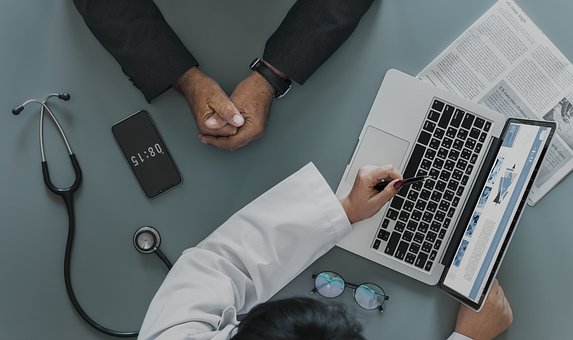Despite years of warnings, the FBI is still issuing alerts about health-care fraud. It can be committed by doctors, hospital employees, patients and criminals who file unlawfully for benefits.
In 2021, the FBI announced it’s working in partnerships:
- Federal, state, and local agencies
- Healthcare Fraud Prevention Partnership
- The National Health Care Anti-Fraud Association, the National Insurance Crime Bureau, and insurance-company investigations
So, medical care in many ways has become an oxymoron. An oxymoron is defined as a figure of speech either as a word or combination of words in direct contradiction of each other.
So, if medical identity-theft is skyrocketing, how is it taking care of patients? The fact is that it’s been the fast-growing trend in ID thievery.
Here are just two headlines from June 2019:
- More than 12M people may be affected by latest medical data breach
- LabCorp discloses data breach affecting 7.7 million customers
Health-care providers apparently can’t trust their employees to use best practices in observing The Health Insurance Portability and Accountability Act (HIPAA), which has been in effect since 1996.
You hear the acronym a lot in healthcare.
However, at issue has always been whether health-care workers keep their mobile devices secure — consider the 2013 HIMSS Security Survey.
Security breaches have occurred at nurses’ stations and behind reception desks because of snooping my employees with financial and medical identity theft not far behind.
Hospitals are securing their devices. But most employee devices haven’t been secure, and 88 percent of respondents in a Benchmark Study on Patient Privacy and Data Security said employees were allowed to use their private mobile devices to access patient records.
Vital Cybersecurity: Your Remote Staff in COVID-19 Crisis
The growing trend of allowing employees to BYOD — bring their own devices — isn’t healthy. It’s bad for the medical profession as well as for other sectors.
More than half — 53 percent — of surveyed global businesses admit they’re not ready to defend against attacks on their employees’ personal devices.
Nearly all say their devices might have been attacked, according to a 2014 study (see Do BYOD Headaches Outweigh Benefits? Yes.)
Employees ostensibly assume their iPhone and Android devices are secure, but they’re not. (See: Surprise — Cyber Criminals Chew up Apple Products, too and Who Profits from Android’s Security Issues? Not Users.)
Guard Against Skyrocketing Trend: Cell-Phone Account Fraud
It isn’t a new issue. The problem of medical identity theft has been growing for years.
Data shows it adversely impacted 1.42 million Americans in 2010. That’s according to a 2011 study by PricewaterhouseCoopers (PwC) that showed medical ID theft aggregately cost more than $28 billion.
“The root cause of the fraudulent use of someone else’s medical identification is that protected medical information is widely dispersed in multiple information systems where it all too often is inadequately secured,” says nationally known security expert, Stan Stahl, Ph.D.
He’s president of Citadel Information Group, Inc. in Los Angeles, and he authoritatively writes about security issues.
MedPage Today shed a bright light on the issue in this article: Medical Identity Theft a Growing Problem.
It reported the three most-common identity breaches:
- Employees who act unprofessionally – improper use of patients’ data in doctors’ offices, hospitals, insurance company and life sciences companies. They’ve even been caught posting comments about patients on Facebook.
- Almost 40 percent of hospitals and physicians report they have caught patients using another person’s identity when they seek treatment.
- Twenty-five percent of insurance companies acknowledge the improper transfer of information in patients’ health files. Unauthorized persons viewed such files.
“Every organization that collects or stores personally identifiable medical information – hospitals, doctors, clinics, pharmacies, billing offices, insurance companies, even employers – has a legal and ethical obligation to properly secure that information,” asserts Dr.Stahl.
In public reports, theft was responsible for 66 percent of medical ID breaches in the recent years. The thefts include notebook computers, smartphones, using another person’s personal information for fraudulent claims, and people using others’ names.
Security breaches often occur at nurses’ stations and behind reception desks because of snooping my employees with financial and medical identity theft not far behind.
More shocking news
Authors of the PwC study indicated most healthcare organizations haven’t been equipped to prevent medical ID theft – despite the growing use of information technology in the medical profession.
“Most breaches are not the result of [information technology] IT hackers, but rather reflect the increase in the risks of the knowledgeable insider related to identity theft and simple human error – loss of a computer or device, lack of knowledge or unintended unauthorized disclosure,” said James Koenig, director of the Health Information Privacy and Security Practice at PwC in a press statement.
More than 50 percent of the study’s respondents who work for healthcare organizations said they have known of at least one privacy breach since 2009.
“Doctors need to take measures to assure their patients are who they say they are,” recommends Dr. Stahl. “That can include checking referrals.”
What can patients do?
“Patients need to treat their medical information with the same care that they treat their financial information, including periodically checking with their insurance company to identify fraudulent activity,” advises Dr. Stahl.
The PwC study indicated that most healthcare organizations admit they haven’t even begun to adequately deal with privacy and security issues in this digital-information age.
Obviously, as a business-performance consultant, here’s my sense:
- The medical profession should emphasize and implement stronger security precautions.
- All medical employees should undergo privacy-confidentiality sensitivity training.
So two issues remain: Health-care institutions and professionals should exercise due diligence. Patients should remain vigilant against the danger of medical ID theft.
Meantime, here’s a salient question: Shouldn’t healthy precautions be part of medical care?
From the Coach’s Corner, you might consider these security-resource links:
How to Enhance Security in Your Company’s Wireless Network — Do you take it for granted that your wireless network is secure? Don’t make that assumption. Wireless routers present dangers. Your router is vulnerable to hackers and, hence, security issues. If you’re really serious about security, WIFI might not be for you. A wired network might be more desirable.
Security Precautions to Take Following Citibank’s Second Reported Online Breach — Citibank’s admission that private information of 360,083 North American Citigroup credit card accounts was stolen by hackers in 2011, which affected 210,000 customers, serves as a warning for all businesses and consumers to take precautionary steps. The bank’s May 2011 security breach wasn’t reported until weeks later.
11 Travel Tips – Save Money, Prevent against Cyber Theft, Fraud — The most vulnerable travelers are businesspeople. That’s because they have to use Internet and e-mail. They’re in danger expressly from vulnerabilities, such as from wirelessly accessible passports to using WIFI.
“If you reveal your secrets to the wind, you should not blame the wind for revealing them to the trees.”
-Kahlil Gibran
__________






